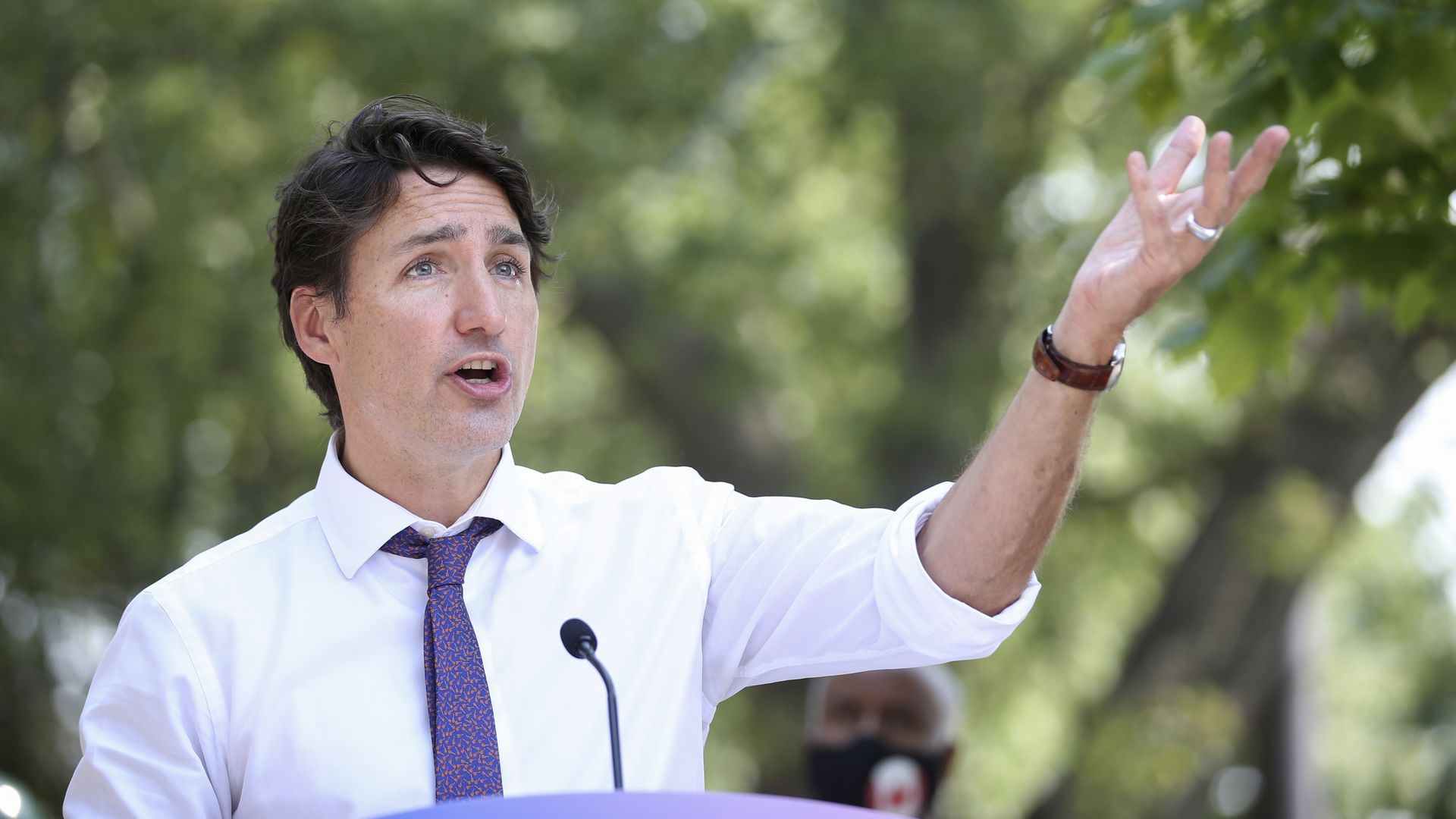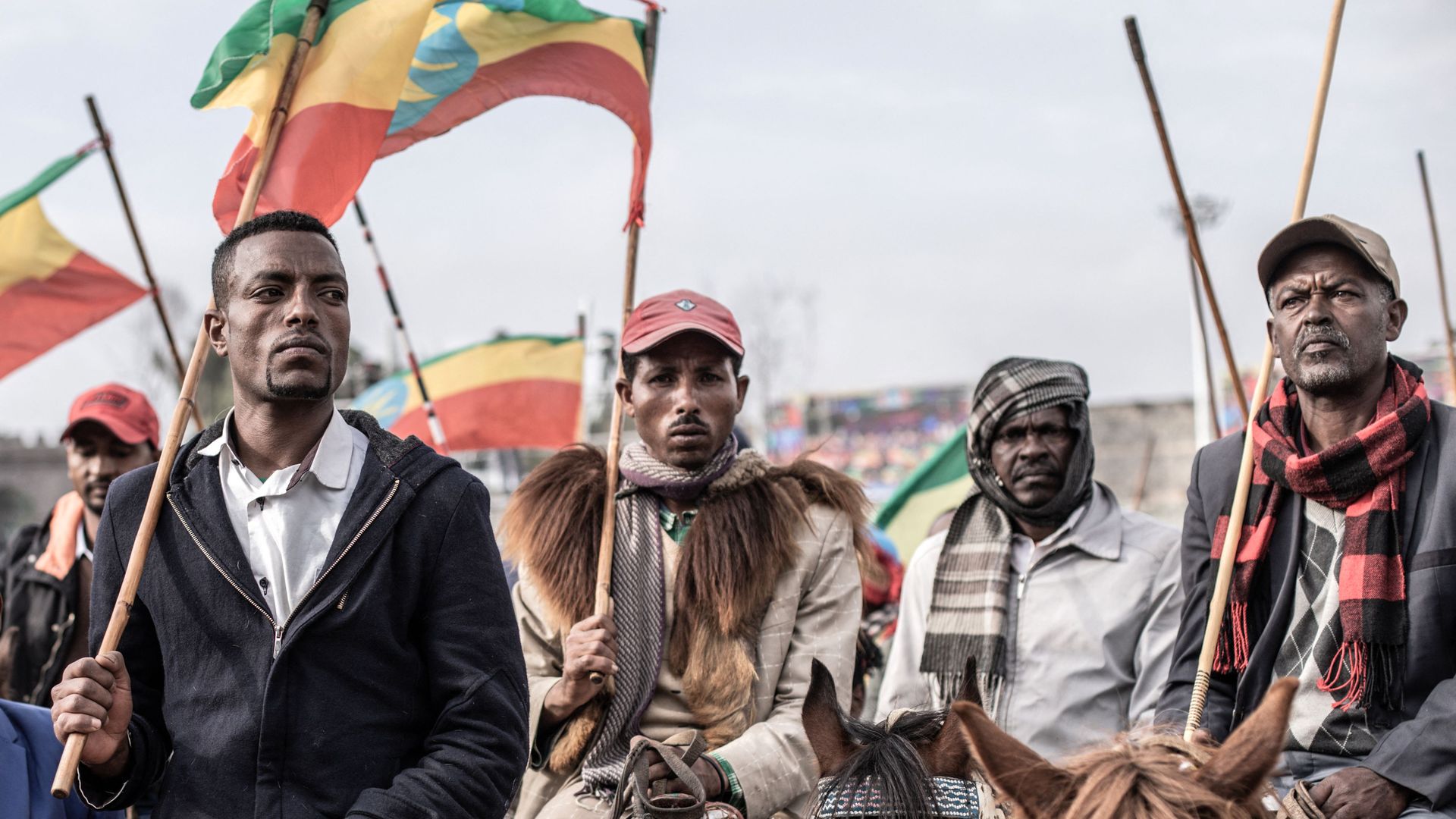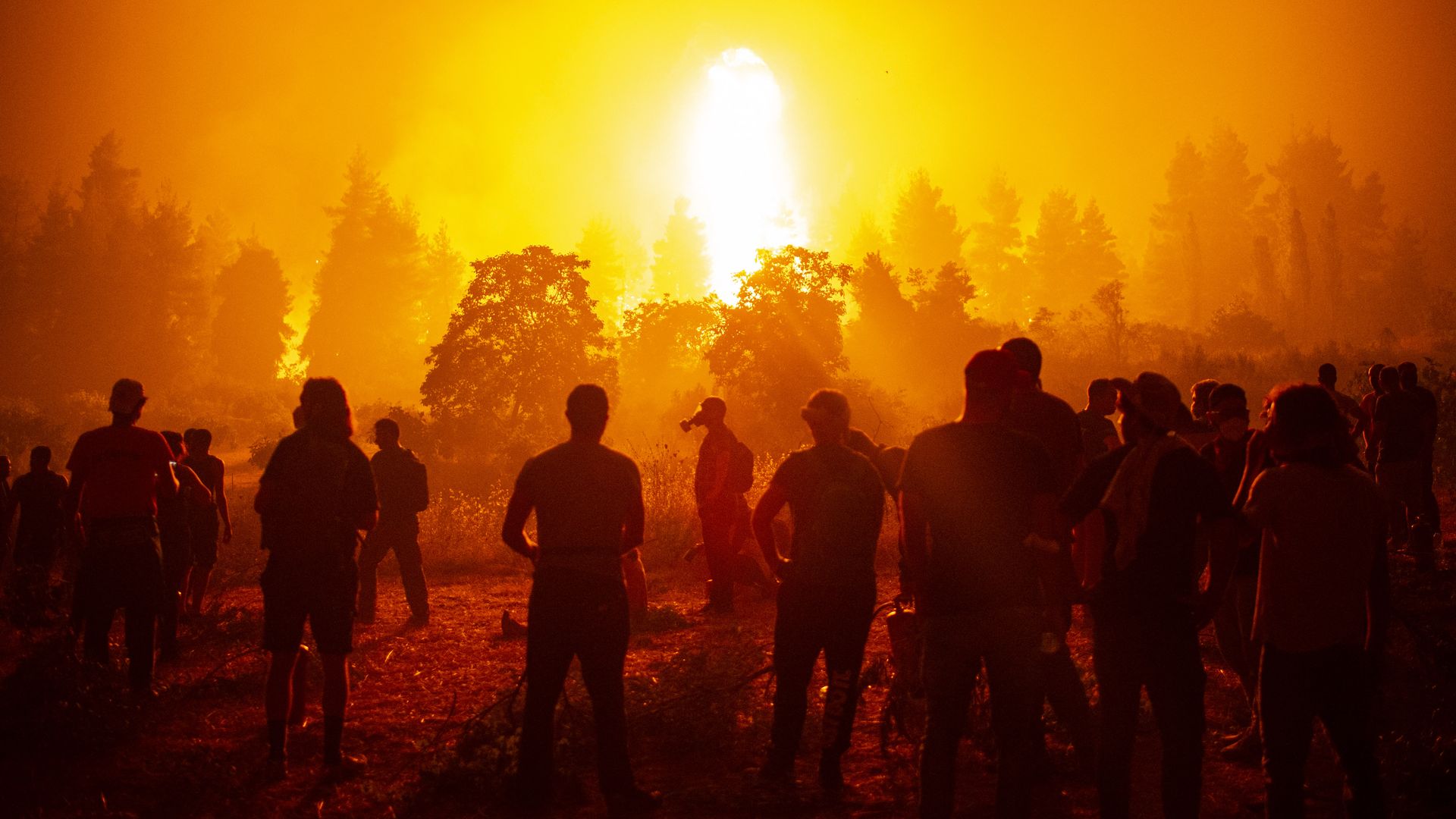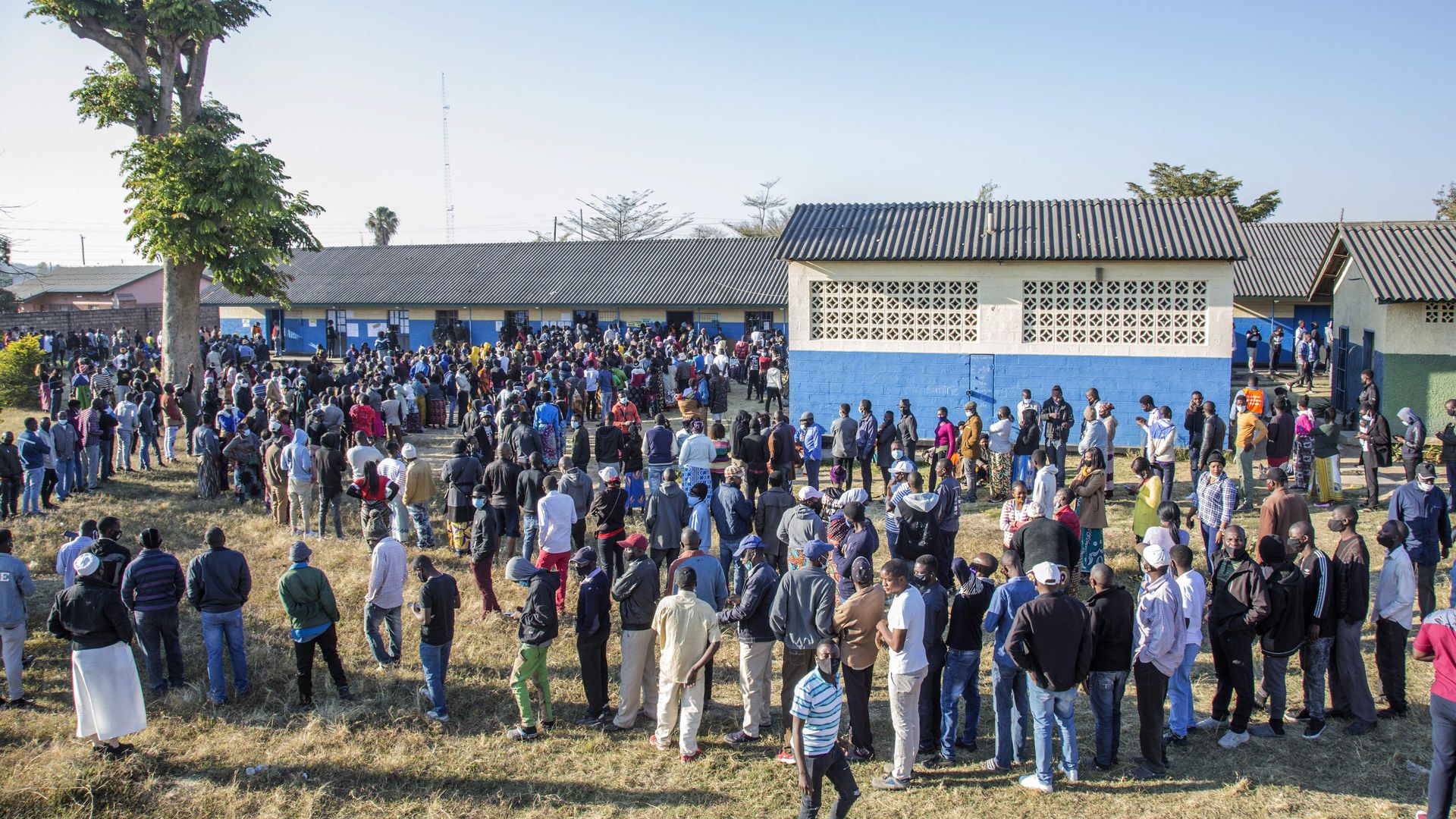| |
| |
| |
| Presented By OurCrowd |
| |
| Axios World |
| By Dave Lawler ·Aug 12, 2021 |
| Welcome back to Axios World. - We're spending most of tonight's edition (1,841 words, 7 minutes) examining two of the world's most devastating conflicts, in Afghanistan and Ethiopia. I'll aim to bring you some better news soon.
Subscribe here if you haven't yet. |
| |
| |
| 1 big thing: U.S. in full evacuation mode in Afghanistan |
 |
|
| U.S. troops at Camp Leatherneck in Helmand. Wakil Kohsar/AFP via Getty Images |
| |
| With Afghan cities falling to the Taliban day after day, the U.S. is sending in more troops — to help evacuate American diplomats. Driving the news: The State Department announced today that it will shrink down to a "core diplomatic presence" in Kabul due to the deteriorating security situation. The Pentagon is sending 3,000 troops to Afghanistan's international airport to assist in that mission and help get Afghans who worked with U.S. troops out of the country. - Behind the scenes: President Biden brought together his senior national security team last night for a briefing on Afghanistan, and by this morning, there was a unanimous decision to send in troops and partially evacuate the embassy.
What they're saying: State Department spokesperson Ned Price attempted to downplay the announcement, insisting that it "shouldn't be read as any sort of message to the Taliban." "This is not abandonment. This is not an evacuation. This is not the wholesale withdrawal." — Ned Price - The Biden administration continues to insist that the Taliban will sacrifice any future international legitimacy if it takes power by force and points to the negotiating table in Doha, Qatar, as the true path forward.
- Such statements sound increasingly futile as the Afghan government's hold on the country evaporates by the hour.
- But Biden has said he has no regrets about his decision to withdraw, and he put the onus on Afghanistan's civilian and military leaders to turn back the Taliban, contending that they still have superior manpower and resources.
A WhatsApp message circulating among senior Afghan military officials over the last 48 hours suggests some hope of a counterattack and the desire for additional U.S. air support. - "We need more air power. The Taliban are out in the open. ... They could not be more exposed," read the message, which was obtained by Axios' Zach Basu. "Two weeks of proper support would mean we get them to the negotiating table and reverse their progress."
- "Remember after 9/11, with good air support, Taliban lost the entire country in two weeks," a senior military leader wrote, pressing his colleagues to push for more help from Washington.
- The Pentagon has said it will provide air support "where and when feasible," in the coming weeks, but hasn't said whether any air support will continue after Aug. 31. U.S. officials note that airstrikes are less effective when the fighting is in heavily populated areas.
What's next: In total, the Pentagon is mobilizing upward of 7,000 troops for the evacuation mission. - In addition to the roughly 3,000 infantry soldiers set to arrive at the airport in the next 48 hours, additional troops will be sent to Qatar to help manage the evacuation of Afghans seeking special immigrant visas.
- Another infantry brigade will be sent from the U.S. to Kuwait to be prepared to provide "additional security at the airport" as needed.
- Pentagon press secretary John Kirby said the partial evacuation of the embassy would be completed by the end of this month, when the U.S. military mission in Afghanistan is also set to end.
Worth noting: Price declined to say how many diplomats would remain in the embassy or whether there was any consideration of moving the embassy to a more secure location. |
    |
| |
| |
| 2. The latest: Three crucial dominos fall |
 Data: Al Jazeera; Map: Axios Visuals Meanwhile, the Taliban today took Afghanistan's second and third largest cities and the provincial capital closest to Kabul. The big picture: That brings the number of provincial capitals captured over the last week to 12, an astounding number considering the group didn't hold a single major city prior to last Friday. The Taliban now controls more than two-thirds of Afghanistan's territory. - The capture of Ghazni puts the front lines within 100 miles of Kabul and cuts off a key highway linking the capital with Afghanistan's southern provinces.
The fall of Kandahar, Afghanistan's second-largest city and the birthplace of the Taliban movement, is more significant still. - The Taliban first seized Kandahar in the 1990s before toppling the Afghan government in Kabul and declaring an Islamic state.
- They were driven out of the city of 600,000 during the U.S.-led invasion of Afghanistan in 2001.
A new U.S. intelligence assessment suggests that Kabul could fall to the Taliban within 30–90 days — a stark revision from a previous assessment that the capital could possibly fall 6–12 months after the U.S. withdrawal. - U.S. officials admit that they've been surprised at the unprecedented pace of the offensive and the decision by so many Afghan forces to abandon the battlefield.
Go deeper: Inside the Biden administration as Afghanistan collapses |
    |
| |
| |
| 3. Canada PM Trudeau expected to call snap election |
 |
|
| Photo: Christinne Muschi/Bloomberg via Getty |
| |
| Canadian Prime Minister Justin Trudeau intends to announce on Sunday a snap election for Sept. 20, Reuters reports, less than two years after the last national vote. Why it matters: Trudeau currently leads a minority government and can only pass legislation with support from opposition parties. But his position has strengthened during the pandemic, and CBC's polling average shows his Liberal Party with a cushion of 6.6% over the opposition Conservatives. An election isn't due for another two years, but early elections are common in Canada's parliamentary system. Still, even with a lead in the polls, calling a snap election carries significant risks for Trudeau. - Per CBC, the Liberal's 35.6% makes "a majority government possible — but far from certain."
Flashback: The last election was waged amid an ethics scandal and revelations that Trudeau had worn blackface at least three times in his past. His personal approval ratings were in the high 30s. - They climbed as high as 62% earlier in the pandemic, as Canada fared better than its neighbor to the south, and currently sit at 48%, per Morning Consult's tracker.
One issue that will come to the fore is Canada's approach to China, where two Canadians are in custody on espionage charges that appeared to come as retaliation for Canada's arrest of Huawei CFO Meng Wanzhou on a U.S. warrant. - One of the men, Michael Spavor, was sentenced to 11 years in prison on Wednesday. Trudeau's government condemned the "sham trial."
- The Conservatives accuse Trudeau of going soft on China and have promised a tougher approach.
|
    |
| |
| |
| A message from OurCrowd |
| OurCrowd helps you add top startups to your portfolio |
| |
 |
| |
| Problem: Startups are staying private longer, keeping investment growth behind closed doors. Solution: OurCrowd is changing that. They have 73K members and have invested $1B+ in companies like Lemonade and Beyond Meat — pre-IPO. Get in early on tomorrow's big deal - with OurCrowd. |
| |
| |
| Bonus: Where in the World |
| Screengrab via Apple Maps We're traveling along the Nile tonight as it passes through three capital cities. - They're marked with a purple pin (near the top), a red X and a red pin (near the bottom).
- A massive infrastructure project that has governments in two of those capital cities quite anxious is marked with a red Y.
Can you name all four? Scroll to the bottom for the answer. And apologies for the makeshift labeling system. |
    |
| |
| |
| 4. Ethiopia I: Civil war spreads beyond Tigray |
 |
|
| An anti-TPLF rally in Addis Ababa. Photo: Amanuel Sileshi/AFP via Getty |
| |
| The civil war in Ethiopia is threatening to spread beyond the Tigray region, with Prime Minister Abiy Ahmed issuing a nationwide call to arms and his foes announcing a new military alliance. Driving the news: On Tuesday, Abiy called on "all capable Ethiopians who are of age to join the defense forces, special forces, and militias and show your patriotism" by taking up arms against the Tigray People's Liberation Front (TPLF). - That announcement follows a stunning reversal in Abiy's war against the TPLF.
Flashback: The TPLF was the most powerful faction in national politics before Abiy took power, and it challenged his legitimacy after he delayed national elections last year. - The dispute spiraled into an armed conflict in which federal troops ousted the TPLF from their regional capital last November.
- But the TPLF regrouped, recruited from the local population, and shocked the Ethiopian forces with a swift counteroffensive that saw them reclaim Mekelle, Tigray's capital, in June.
State of play: Abiy declared a unilateral ceasefire as his troops withdrew, but his forces have renewed a blockade of the rebel-held areas even as hundreds of thousands of people are facing famine conditions, says William Davison, the International Crisis Group's Ethiopia analyst. - Meanwhile, the TPLF has begun taking towns in neighboring regions, beyond Tigray's borders.
"The latest call to arms looks like a reflection of the weakness of Ethiopia's federal military, the current relative lack of support from Eritrea's military, and also of the failure of recently recruited regional security forces and militia to defeat the Tigrayan forces," Davison says. - It's far from clear that "deploying increasingly raw recruits into battle" will turn the tide, he adds, but "there is reason to believe there will be thousands of more deaths on the battlefield and increasing destabilization of Ethiopia."
- Meanwhile, the announcement that the TPLF would be joining forces with insurgents from Ethiopia's largest ethnic group "increases the threat to Abiy's rule," Davison says. However, the capabilities of the group, the Oromo Liberation Army, aren't fully known.
|
    |
| |
| |
| 5. Ethiopia II: The threat of "complete catastrophe" |
 |
|
| Prime Minister Abiy Ahmed. Photo: Jemal Countess/Getty Images |
| |
| "There's a potential for this to be a complete catastrophe. The Tigrayan forces have shown their intent and capabilities, and these efforts to combat them look rather chaotic," Davison says. - The TPLF's ambitions have grown beyond retaking power in Tigray. They now want to force Abiy's removal from power.
- But if they continue to push their offensive beyond Tigray they'll have to contend with more hostile local populations, Davison says.
Abiy does seem to retain the support of a large proportion of the population, as was underscored by his victory in a flawed election in June. - But in addition to the deteriorating military situation, the Nobel laureate also faces growing international criticism over alleged ethnic cleansing and mass sexual violence by troops in Tigray.
- He declined to meet with USAID administrator Samantha Power when she visited Addis Ababa last week, Foreign Policy reports.
What's next: National security adviser Jake Sullivan tweeted tonight that Biden had asked the U.S. envoy for the Horn of Africa, Jeffrey Feltman, "to return to Ethiopia at this critical moment" and he called on all sides to negotiate. Go deeper: People of Tigrayan ethnicity are being arbitrarily arrested across Ethiopia, WSJ reports. |
    |
| |
| |
| 6. Global news roundup |
 |
|
| Fighting a fire on Euboea island in Greece. Photo: Angelos Tzortzinis/AFP via Getty |
| |
| 1. Poland's right-wing government forced through a bill on Wednesday to ban non-European entities from holding broadcast licenses — a move designed to hobble a popular independent TV station owned by U.S. company Discovery. - The big picture: The ruling Law and Justice party has systematically undermined Poland's independent media. The U.S. objected to the new law.
2. Iraqi Prime Minister Mustafa al-Kadhimi is attempting to organize a summit at the end of August that could get his neighboring rivals — Iran, Saudi Arabia and Turkey — around the same table for the first time in years, Axios' Barak Ravid reports. 3. The head of a Russian lab specializing in hypersonic technology was arrested on treason charges for allegedly passing secrets to a foreign person, per AP. |
    |
| |
| |
| 7. Stories we're watching |
 |
|
| Lining up to vote today in Zambia. Photo: Salim Dawood/AFP via Getty |
| |
- In photos: Where wildfires are blazing around the world
- U.S. calls on OPEC+ to increase oil production. Odd timing?
- Belarus blocks U.S. ambassador over sanctions
- Israel to approve new building in West Bank
- Hong Kong's main teachers' union disbands amid crackdown
- Chinese officials punished for not controlling Delta spike
- German nurse suspected of swapping vaccine with saline
Quoted: "I take exception to the notion that somehow over the course of 20 years we simply failed in trying to improve the competency and capability of Afghan forces when we look at what they're doing today." — Pentagon press secretary John Kirby yesterday |
    |
| |
| |
| A message from OurCrowd |
| Meet the VCs that invested in Lemonade and Beyond Meat before the IPOs |
| |
 |
| |
| Global network of 73K+ members and 1000+ MNCs (from Honda to P&G and Travelers to Pepsico), OurCrowd accelerates startups' success. Typical rounds are $2-$20M, with opportunity for more alongside institutional investors. Take the next step to global success - with OurCrowd. |
| |
| Answer: The capitals (North→ South) are Cairo, Khartoum and Juba. The project is the Grand Ethiopian Renaissance Dam. |
 | | It'll help you deliver employee communications more effectively. | | |
No comments:
Post a Comment